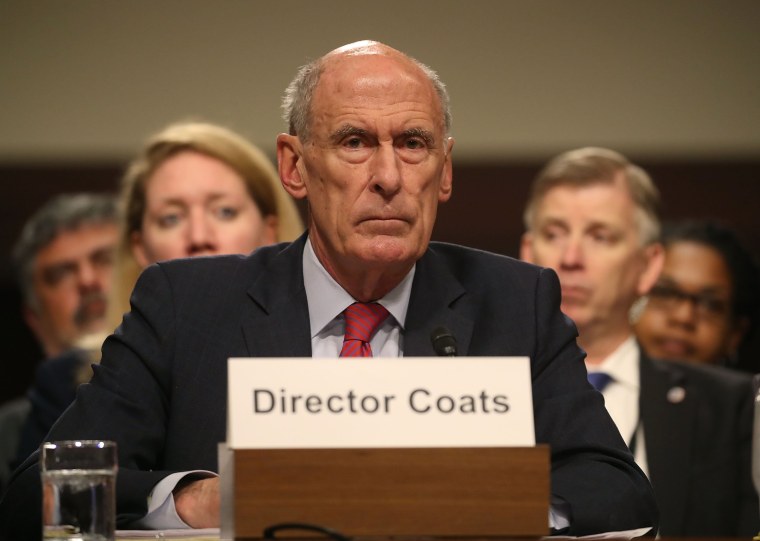Over the last couple of years, we've seen plenty of instances -- too many, really -- in which Donald Trump and top members of his foreign policy team appear to work for entirely different administrations. But Director of National Intelligence Dan Coats has long been a special case.
Last summer, Coats appeared with NBC News' Andrea Mitchell for an interview at the Aspen Security Forum, and their chat became more newsworthy than many expected. As Rachel noted at the time, the DNI made headlines when he was caught completely off-guard by news, which broke during the interview, that his boss had invited Russian President Vladimir Putin to the White House for a visit.
At the same event, Coats expressed some concern about the American president siding with Putin over U.S. intelligence; Coats conceded he was opposed to Trump's insistence on a private one-on-one meeting between the two presidents; and he acknowledged that it wasn't a good idea for Trump to welcome two Russian officials into the Oval Office last year, at a meeting in which Trump leaked sensitive intelligence.
Taken together, it was hard not to get the impression that the nation's chief intelligence official doesn't always see eye-to-eye with his boss. (The White House was not pleased.)
Six months later, it's clear that Coats and Trump continue to read from different scripts.
A new American intelligence assessment of global threats has concluded that North Korea is "unlikely to give up" all of its nuclear stockpiles, and that Iran is not "currently undertaking the key nuclear weapons-development activity" needed to make a bomb, directly contradicting two top tenets of President Trump's foreign policy.Daniel R. Coats, the director of national intelligence, also challenged Mr. Trump's insistence that the Islamic State had been defeated, a key rationale for his decision to exit from Syria. The terror group, the annual "Worldwide Threat Assessment" report to Congress concluded, "still commands thousands of fighters in Iraq and Syria," and maintain eight branches and a dozen networks around the world.
This isn't an example of a president and the nation's top intelligence official differing over nuances and degrees; rather, Trump and Coats have drawn wildly different conclusions about some of the most pressing security issues on the planet.
Trump has said Russia is done trying to interfere in our elections, and Coats this morning said the opposite. Trump has said North Korea is "no longer a nuclear threat" and the White House will rid the dictatorship of its nuclear weapons, while Coats told senators the opposite.
Trump recently boasted this administration has "defeated" ISIS, and Coats said the opposite. Trump and his allies have repeatedly warned of Iran moving toward a nuclear weapon, and Coats assured senators in his testimony that this isn't happening.
And while Trump is obsessed over security threats at the southern border, the annual "Worldwide Threat Assessment" report, which Coats is broadly responsible for, largely ignored the issue.
The point is not to mock the intra-administration fissures and contradictions. Rather, what matters is that we appear to have a president who routinely ignores the findings of his own director of national intelligence.
That's not how any of this is supposed to work.
